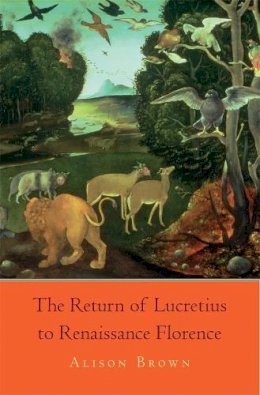
The Return of Lucretius to Renaissance Florence
Alison Brown
In this first comprehensive study of the effect of Lucretius's De rerum natura on Florentine thought in the Renaissance, Alison Brown demonstrates how Lucretius was used by Florentine thinkers—earlier and more widely than has been supposed—to provide a radical critique of prevailing orthodoxies.
To answer the question of why ordinary Florentines were drawn to this recently discovered text, despite its threat to orthodox Christian belief, Brown tracks interest in it through three humanists—the most famous of whom was Machiavelli—all working not as philologists but as practical administrators and teachers in the Florentine chancery and university. Interpreting their direct use of Lucretius within the context of mercantile Florence, Brown highlights three dangerous themes that had particular appeal: Lucretius's attack on superstitious religion and an afterlife; his pre-Darwinian theory of evolution; and his atomism, with its theory of free will and the chance creation of the world.
The humanists' challenge to established beliefs encouraged the growth of a "Lucretian network" of younger, politically disaffected Florentines. Brown thus adds a missing dimension to our understanding of the "revolution" in sixteenth-century political thinking, as she enriches our definition of the Renaissance in a context of newly discovered worlds and new social networks.
Product Details
About Alison Brown
Reviews for The Return of Lucretius to Renaissance Florence
John M. Najemy, Cornell University Brown unearths the roots of modern religious skepticism, atomism, and theories of the universe in the rediscovery of Epicurus and his Roman avatar Lucretius in fifteenth-century Florence. She charts the influence of his De rerum natura in the writings of Leonardo Bruni, Lorenzo Valla, Leon Battista Alberti, Marsilio Ficino, Niccolò Machiavelli, and others in a city increasingly torn by civil strife. This book is a must-read for all concerned not only with the humanist revolution in Renaissance Italy but also the origins of Enlightenment thought in Europe.
Diana Robin, University of New Mexico Alison Brown has made an important contribution to a crucial chapter in the history of modern thought. Tracking manuscript circulation and following a complex trail of hints and buried allusions, Brown explores the ways in which an ancient poem dangerously at odds with Christian orthodoxy subtly penetrated key intellectual networks.
Stephen Greenblatt, Harvard University The rediscovery of Lucretius during the Renaissance invited readers to wonder whether God intervened in human affairs, even as they marveled at the understated, hauntingly beautiful Latin. Lucretius and his brand of Epicureanism were important to the period in all its manifestations, and now Brown offers a groundbreaking, clearly written study that every scholar concerned with the Italian Renaissance will want to read carefully.
Christopher Celenza, Johns Hopkins University
